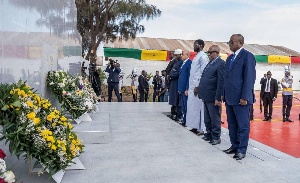Africa News of Friday, 6 June 2025
Source: www.ghanawebbers.com
Senegal: Bullets Unearthed in Senegal Cemetery Could Shed Light On Thiaroye Massacre
Archaeologists in Senegal have found skeletons with bullets during an excavation. This site is at the former military camp of Thiaroye, near Dakar. French soldiers massacred African colonial troops there.
Excavations began in early May. They aim to clarify events from December 1, 1944. On that day, African riflemen protested unpaid wages and were shot dead.
This massacre is one of the worst during French colonial rule. Questions remain about how many soldiers died and where they were buried. French authorities reported 35 deaths, but historians believe it could be as high as 400.
A source told AFP that human skeletons had bullets in them. Some bullets were found in the chest area and varied in caliber.
So far, only a small section of the cemetery has been excavated. Forensic analysis will help identify bullet types and buried individuals. Léa-Lisa Westerhoff from RFI noted that this operation has been secretive.
There has been no official disclosure of findings yet. Some say it's too early to discuss results. Others mention a report being drafted for Senegalese authorities before public release after Eid al-Adha.
Around 1,600 West African soldiers arrived at Thiaroye camp in November 1944. They had been captured by Germany while fighting for France. Discontent grew over unpaid wages and demands for equal treatment with white soldiers.
On December 1, French forces opened fire on these soldiers. Researchers have long called for excavations at Thiaroye cemetery and nearby military camp.
In February, the Senegalese government announced these excavations to uncover the truth about the massacre. Last November, France acknowledged the massacre just before its 80th anniversary commemoration.
The tirailleurs unit was formed in Senegal in 1857. Troops were recruited from Central and West Africa to defend French colonial interests. During World War I, around 200,000 served in Europe; nearly 30,000 died in battles like Verdun.











